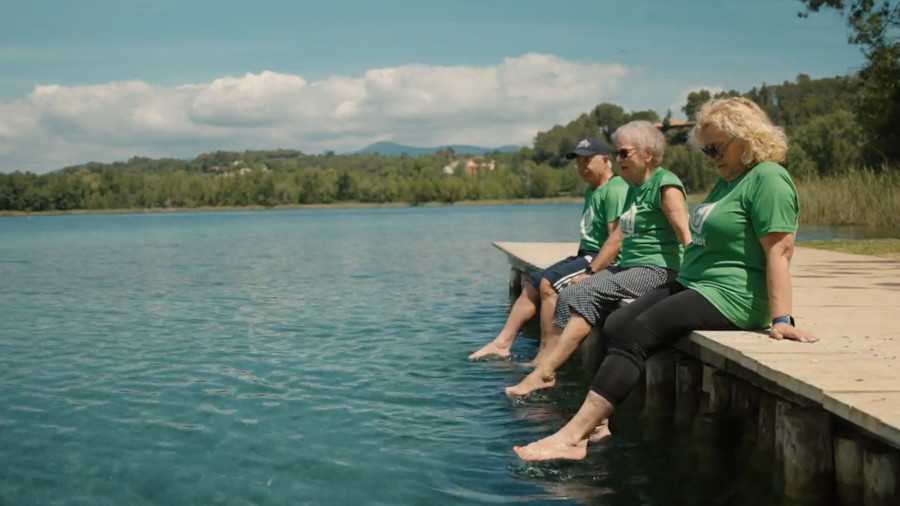Programme of activities in nature with positive effects on emotional well-being developed
The scientific study of the "Get Active with Nature" programme, carried out by the NAT (Nature-Activity-Therapy) research group of the UAB with the Girona Provincial Council, shows significant effects, such as reductions in fatigue and stress, increases in activation, and improvements in emotional control, mood and self-efficacy.

Today the results were presented of the scientific study of the "Get Active with Nature" programme, carried out by the NAT (Nature-Activity-Therapy) research group of the Universitat Autònoma de Barcelona, under the initiative of the Area of Health Promotion, Welfare and Care of People of the Public Health Agency of the Girona Provincial Council (Dipsalut).
The main objective of the NAT-Dipsalut study was to evaluate the impact of the intervention "Get Active with Nature" on emotional well-being and mental health, in order to assess the suitability of promoting the practice of guided physical activity in nature among the general population and the prescription of nature among health professionals.
As stated by the third vice-president of the Girona Provincial Council and president of Dipsalut, Maria Puig Ferrer, "the results obtained show that this programme has positive effects both in the short and long term in various aspects related to emotional well-being, social bonding and connection with nature. Prescribing sessions of guided physical activity in nature on a continuous basis works!".
Dr Antoni Sanz Ruiz, coordinator of the scientific study NAT-Dipsalut, member of the Stress and Health Research Group (GIES) and the Institute of Sports Research (IRE-UAB), pointed out that "the emotional and cognitive effects observed in the short term (i.e., in the course of the practice of guided physical activity in nature) are remarkable; even from the first sessions, slight reductions in fatigue and moderate reductions in stress, moderate increases in activation and emotional control, and an intense improvement in mood and in the perception of the ability to practice physical activity (self-efficacy) can be observed".
Dr Sanz pointed out that this last result is especially relevant for two reasons. Firstly, because self-efficacy is one of the most relevant "building materials" of self-esteem, which plays an essential role in the promotion of emotional well-being and in the prevention of mental disorders. Secondly, because self-efficacy is a motivational factor that influences people's persistence in performing behaviours, so it may be key to long-term adherence to intervention programmes based on this practice and to the adoption of a healthy lifestyle that contains, among other aspects, the autonomous practice of physical activity in nature.
The NAT-Dipsalut study has also shown that the "Get Active in Nature" programme produces positive long-term effects. According to the study coordinator, "this indicates that there is a cumulative effect on emotional well-being that goes beyond the improvements experienced during each of the twenty practice sessions distributed over six months, so that the programme as a whole ends up having a positive and generalised impact on people's daily lives".
Thus, compared to the "spontaneous" evolution observed in the group of people not participating in the programme (control group), the people participating in the programme (intervention group) experienced a better evolution in the perception of quality of life, personal growth, sense of coherence and self-esteem, as well as a reduction in the levels of stress, depression and loneliness.
Maria Estrada Ocón, head of Dipsalut's Area of Health Promotion, Welfare and Personal Care, remarked that "the results obtained in the 'Get Active with Nautre' programme not only highlight the importance of doing physical activity in nearby green spaces, but also the relevance of carrying it out in a group and with the accompaniment of professionals who guide and dynamise it."
The results, according to Estrada, indicate that it is crucial to maintain programmes that help to encourage the autonomous practice of physical activity in nature on a continuous basis, since the study shows a tendency for the positive effects to diminish after six months of participation in the programme.
In this way, it can be ensured that it becomes a healthy and adaptable behaviour in the daily lives of citizens that contributes to their physical and emotional well-being in the long term, capable of being systematically incorporated into socially prescribed actions.
During her speech, the president of Dipsalut, Maria Puig, explained that "the Public Health Agency of the Girona Provincial council, with this pioneering proposal, not only aims to improve the health and well-being of people, but also to value nature as a health asset, involving the community in the conservation of natural areas of proximity and in the creation of healthy and sustainable places".
Puig announced that Dipsalut will initiate a new study, in collaboration with the Nat Group and the Forest Therapy Hub team, to evaluate the impact on health and well-being of the forest baths carried out as part of the "Get Active with Nature" programme.
The president of the Public Health Agency of the Girona Provincial Council said at the end of her speech: "the results of this study validate our strategy for the future, which is to expand the scope of 'Get Active with Nature'. I hope that these actions contribute to improve the health and welfare of citizens, as well as to increase environmental awareness to take care of the planet, giving back to nature the care and welfare it provides to us".
During the press conference, a video was also presented in which the users of Dipsalut's "Get Active with Nature" programme talk in first person about the benefits it has provided them.
The UAB, with Sustainable Development Goals
Good health and well-being